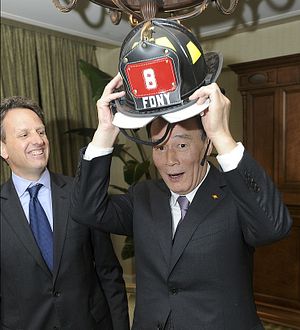When Chinese President Xi Jinping came to power in 2012, one of his first moves was to implement an anti-corruption crackdown. To date, those efforts have netted a number of big names, most notably Zhou Yongkang, a former member of the Politburo Standing Committee, a post long thought to make its holders untouchable. From the PBSC to the People’s Liberation Army (where the two previous vice chairs of the Central Military Commission, Generals Guo Boxiong and Xu Caihou, were both toppled) to local governments, the anti-corruption campaign has run deeper and longer than observers expected — and Beijing wants everyone to know that the crackdown is far from over.
China’s top anti-graft body, the Central Commission for Discipline Inspection (CCDI) held its major annual meeting from January 12 to 14 in Beijing. Nearly two weeks later, the CCDI posted the work report made by anti-graft chief Wang Qishan on its website (which were also picked up by Xinhua).
Wang’s key point is clear: to highlight the party’s continuing will to fight corruption. Wang urged all party organizations to “dare to take up the responsibility, dare to be serious, dare to struggle, and resolutely defend the solemnity of party regulations and party discipline.”
Meanwhile, Xi himself personally urged Party members to “maintain confidence in the CPC Central Committee’s anti-corruption volition” at the CCDI meeting. And the communique issued after the CCDI meeting was clear that disciplinary inspections will be stricter than ever in 2016.
So who should be worried about being the next “tiger” to be caught? In his remarks, Wang identified three categories of corrupt officials as the highest priority for investigations: those who have continued corrupt activities (who have not “restrained themselves”) after the 18th Party Congress in fall of 2012 signaled the onset of the crackdown; those who have “serious problems” and have sparked a “fierce reaction” from the public; and those who occupy key posts and are in line for promotions to party leadership positions.
The first category signals that the CCDI will be limiting its focus to corruption that took place after Xi came to power in 2012 – an interesting shift, given that most of the “tigers” caught so far were all active in the party under Xi’s predecessor, Hu Jintao. As many observers have noted, no officials with any connection to Xi (including fellow princelings, the children of high-ranking party officials) have been caught up in the crackdown. If the CCDI is now turning its focus to officials who are currently in office, that could change.
The second category reflects the knowledge that corruption is a major obstacle to the relationship between the party and China’s people. As such, any party official who has caused “fierce” public opposition is on notice: the CCDI will be looking into such cases as a way to both mollify the people and prove the efficacy of the anti-corruption crackdown.
The third and final category is potentially the most interesting, as it could reshape China’s political landscape ahead of a once-every-five-years leadership reshuffle. Next year, in fall 2017, the Chinese Communist Party will appoint new leaders at the 19th Party Congress. Xi and Premier Li Keqiang should keep their posts according to tradition (although there are persistent rumors that Li, nominally in charge of China’s economy, could be scapegoated for the country’s slowdown). However, the other five members of the Politburo Standing Committee (including Wang Qishan himself) are all due to retire, leaving most of the spots on China’s top leadership body open – and two of those spots will go to Xi and Li’s eventual successors.
As China heads into full-on political jockeying behind the scenes in preparation for 2017, the CCDI will be doing its own part by stepping up investigations of those who are in line for promotion to party leadership positions. The anti-corruption campaign has already claimed one potential target for promotion in 2016: Gong Qinggai, the deputy director of the Taiwan Affairs Office, was announced to be under investigation in mid-January. Gong was believed to be in line to replace current TAO head Zhang Zhijun, the top official in charge of cross-strait relations, according to the South China Morning Post.
Whether this looks like an attempt to stack the deck by removing political rivals or a good-faith effort to ensure China’s future leaders are clean will largely depend on your perspective, and what you think of the anti-corruption campaign overall (my own take? It’s both — a neat fusion of political idealism and opportunism). Certainly Xi can’t escape charges of the campaign being politically motivated until some of his own allies fall under the CCDI hammer. Will 2016 be the year?

































